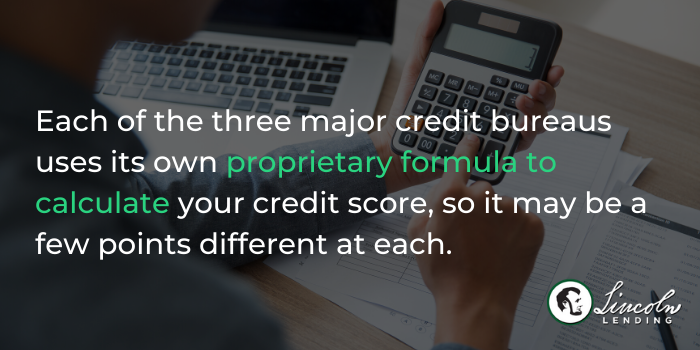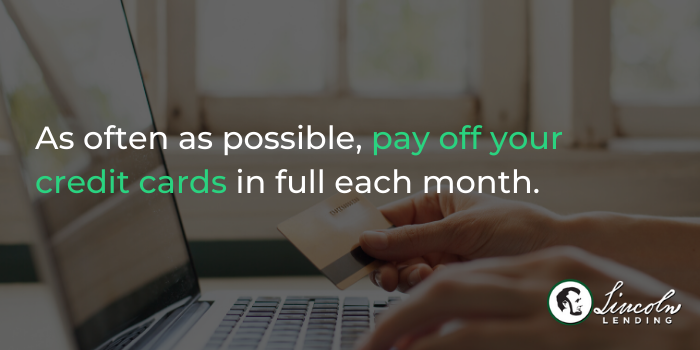Do you know what your credit score measures and how the number affects your eligibility for a home loan? If you’re thinking about purchasing a home, you should also be thinking about how to improve your credit score. Not only are borrowers with higher scores more likely to qualify for a loan, but they also tend to get better loan terms.
What Is a Credit Score?
Your credit score is a measurement of how likely you are to pay your debts.
Higher scores indicate that a person is more likely to pay, while a lower score indicates that a person is more likely to miss payments or default on a loan.
Credit scores typically range from 300 – 850. Lenders use your credit score to determine your eligibility for loans (home, personal, auto, student, etc.) and credit cards.

There are three primary credit bureaus that calculate your score: Equifax, Experian, and TransUnion. Each bureau calculates your score based on a few primary factors, including:
- Whether you make payments on time
- How many lines of credit you have
- The average age of your lines of credit
- The types of credit you have (auto loan, credit card, student loan, mortgage, etc.)
- How much of your credit limit you’re using
- Your total amount of debt
- The number of hard inquiries on your credit report
- The number of paid or unpaid collections accounts on your history
- Whether you’ve declared bankruptcy
- Whether you’ve had a home foreclosed upon
Hard inquiries are when a lender pulls your credit, with your consent, because you’ve applied for a line of credit or a loan. They often cause your score to drop slightly and usually stay on your credit report for two years.
A soft pull happens when someone does a background check, such as a new employer or a credit card company that wants to offer you a pre-qualification offer. Soft pulls do not require your authorization, so they should not show up on your credit report or affect your score.
Speak with your lender about how several hard pulls can negatively affect your credit score. If you’re shopping for a loan, all hard pulls within 30 days may be reported only once to minimize the effect on your score.
Each of the three major credit bureaus uses its own proprietary formula to calculate your credit score, so it may be a few points different at each. Also, not all creditors report changes like opening a new credit card to all three bureaus, which can create some variability in your scores.

Each industry uses its own algorithm to determine your credit score and loan eligibility. For example, your score on credit monitoring sites, such as Credit Karma, may not reflect the same score that a car dealership or mortgage company pulls.
How Can Your Credit Score Affect Your Home Loan Eligibility?
Your credit score affects your ability to get pre-approval for a mortgage, and it affects the amount of money that you can borrow (which also affects the home size and quality that you can afford). It also affects the interest rate that you’ll get on a mortgage, and how much, if any, you’ll need to pay for private mortgage insurance.
Your credit score is like a risk assessment — the higher your score, the lower the risk of you defaulting on a loan. To protect against possible defaults, lenders often charge higher interest rates to those with lower credit scores. A higher interest rate means that you’ll pay more over the life of your loan, so it’s in your best interest to improve your score before you apply for a home loan.
Strategies for Raising Your Credit Score
Building good credit takes time, but there are a few things that you can do now to create good habits and help strengthen your score.
1. Pay All Bills on Time
Your credit score is a measurement of your likelihood of paying off your debt on time, so one of the best things that you can do is always to pay your bills on time. This means ALL of your payments, from your credit cards to your rent and your cell phone.
If you struggle to remember to pay your bills on time, consider setting up auto-payments, setting reminders on your cell phone, or creating recurring alerts in a digital calendar.
2. Keep Your Debt Low
Your credit score improves when you have available, but unused credit. As often as possible, pay off your credit cards in full each month. A good rule of thumb is to keep your debt below 30% of your limit. For example, if you have $5,000 of available credit, try to keep your balance below $1,500. Even better would be 10% or lower each month.

3. Don’t Open Multiple Credit Cards at Once
Having credit cards and paying them off each month can help you build credit if you don’t have a very long credit history. However, opening several new credit card accounts within a few months may hurt your score. To a creditor, it may look as if you’re about to rack up a lot of debt, which makes you risky.
If you want to improve your score by using and paying off your monthly credit card balance, make sure that you wait a few months between opening accounts.
4. Keep Old Credit Cards, Even If You Aren’t Using Them
All things being equal, someone with a 10+ year line of credit will usually have a higher score than someone with a new line of credit, even if they both pay off the balance each month.
If you aren’t using an old card anymore, consider keeping the account open to lengthen the overall age of your credit. Also, having a card with a $0 balance helps increase the amount of unused credit that you have.
5. Check Your Credit Report and Dispute Any Inaccuracies
You’re entitled to a complete copy of your credit report each year without a negative impact on your score, so pull your report each year. Check it carefully and dispute any inaccuracies. Possible errors may include:
- Incorrect personal information (misspelled name, incorrect previous address, etc.)
- Records of late payments that you actually made on time
- Accounts that you personally did not open (fraudulent accounts)
- Accounts that you DO have that are not on your report
- Old collection accounts that are still on your report
There are several online services, such as PrivacyGuard and Credit Karma, that make monitoring your credit easier.
6. Pay Off Debts That Have Gone to Collections
The Fair Credit Reporting Act limits the length of time that derogatory marks, such as collection accounts, can remain on your credit report to seven years plus 180 days from the date of the delinquent payment. If a collection account is still on your report after more than seven years, you can dispute it to have it removed from your report.
7. Open a Credit Card
If you’re young and don’t have much credit history yet, it’s time to start building!
Open a credit card and pay the balance off in full each month to start creating a history of on-time payments. Keeping your balance low also improves your ratio of unused credit. There’s no quick fix for building a credit history, so start building now well in advance of when you’ll want to purchase a home.

Meet With a Home Loan Coach
While a home loan coach can’t offer you specific advice, he or she can help you strategize for how to qualify for your preferred home loan. You can discuss everything from how much you should save for a down payment to how you can raise your credit score.
Get in touch with Lincoln Lending today to schedule a no-cost, no-obligation coaching session to create a strategy to get you ready for a future home purchase. It’s never too early to start planning!

